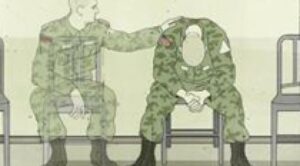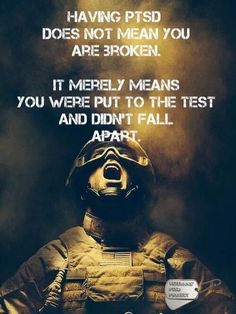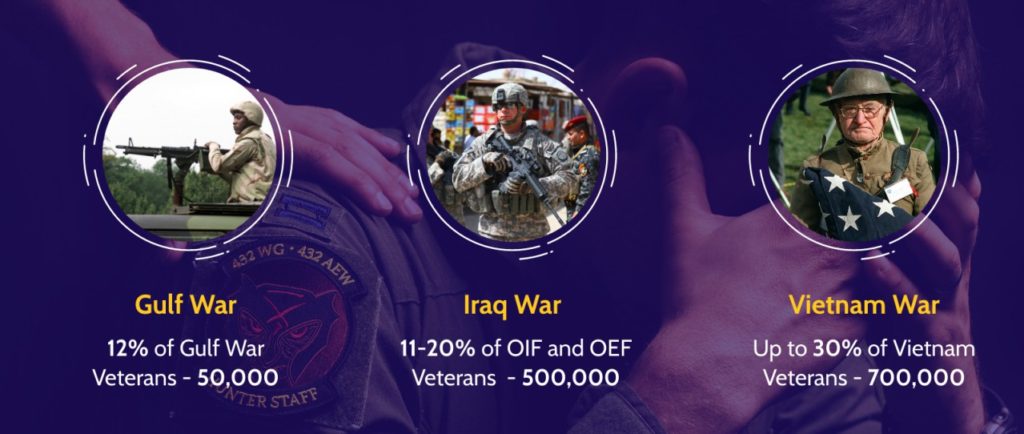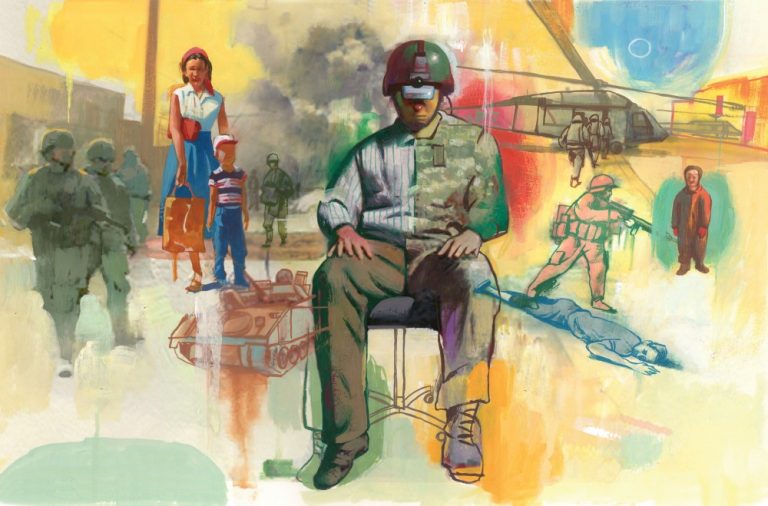Military PTSD is a very real and serious disorder that can affect veterans after they return home from active duty. It can cause many different symptoms, which can make it difficult for sufferers to cope day-to-day.
In this blog post, we will explore military PTSD in detail, including the different types of PTSD, the symptoms, risk factors, and treatment options. We will also hear from experts on military PTSD and learn about the latest research into this condition.
Contents
- 1 Understanding Military PTSD
- 2 Grounding Yourself During Flashback
- 3 Dealing With Survivor’s Guilt
- 4 Coping With Military PTSD
- 5 Connecting With Civilians
- 6 Talking To a Professional
- 7 Helping Someone With Military PTSD
- 8 Preventing Suicide In Veterans With PTSD
- 9 Hearing from Experts’ On Military PTSD
- 10 Conclusion
- 11 A Word From Therapy Mantra
Understanding Military PTSD

Military PTSD is a type of PTSD that can develop in military personnel who have experienced or witnessed traumatic events while on active duty. It can cause many different symptoms, which can make it difficult for sufferers to cope day-to-day. Military PTSD is not a new condition, but there has been an increased focus on it in recent years due to the number of veterans who are returning home with the disorder.
PTSD In Recap
Post-traumatic stress disorder (PTSD) is a mental health condition that is caused by experiencing or witnessing a traumatic or terrifying event. This could be anything from war, abuse, kidnapping, and torture to accidents, domestic violence, disasters (natural and manmade), terrorism, and violent crime. The range of possible events causing PTSD is endless.
Types of Military PTSD
Several types of military PTSD can affect veterans: acute stress disorder (ASD), post-traumatic growth (PTG), and chronic PTSD. These three conditions can be experienced independently or together.
Chronic PTSD
Chronic PTSD is the most common type of military PTSD. It occurs when symptoms persist for more than three months after the traumatic event. People with chronic PTSD often have flashbacks, nightmares, and intrusive thoughts about the event. They may also feel constantly on edge and be easily startled.
Acute Stress Disorder (ASD)
Acute stress disorder is a short-term condition that occurs in the first month after exposure to trauma. The symptoms of ASD are similar to those of PTSD, but they last for less than four weeks and tend to be more severe. People with ASD have a greater chance of developing PTSD if their symptoms continue beyond four weeks.
Post-Traumatic Growth (PTG)
Some people who experience a traumatic event may feel like their life has changed for the better. This is known as post-traumatic growth (PTG). PTG is not common, but it does occur in some people. People with PTG often report feeling stronger, more compassionate, and more connected to others after experiencing trauma.
Symptoms of Military PTSD
The symptoms of military PTSD can vary from person to person, but some common symptoms often occur. These include:
Guilt and shame: Many people with military PTSD feel guilty and ashamed about what happened to them during their time in the military.
Anger and irritability: People with military PTSD often feel angry and irritable for no reason. This can lead to fights with friends, family, or co-workers.
Intrusive memories: These are unwanted thoughts or images of the traumatic event that keep popping into a person’s head, even when they don’t want them to.
Flashbacks: This is when a person sees, hears, smells, or feels something that reminds them of the traumatic event. This can cause intense feelings of fear, horror, and helplessness.
Nightmares: This is when a person has dreams about the traumatic event that are so vivid and terrifying it feels like they’re reliving it over again. They may wake up in a panic as if they were there.
Difficulty sleeping: People with military PTSD often have trouble falling or staying asleep. They may wake up frequently during the night and feel exhausted the next day.
Hyperarousal: This is when a person feels constantly on edge and is easily startled. They may have a hard time relaxing and feel like they’re always in danger.
Depression: Some people with PTSD develop depression as a result of their symptoms. They may feel sad or hopeless most of the time and have trouble getting through each day without crying.
Anxiety: People with military PTSD may feel anxious for no reason at all. They may also have panic attacks or become afraid of being in crowds, driving over bridges, or taking elevators.
Suicidal thoughts: Some people with PTSD feel like they don’t want to live anymore because it’s too hard for them to cope with their symptoms daily. This can lead to suicidal thoughts and attempts.
Negative thoughts: People with military PTSD often have negative thoughts about themselves, the world, and other people. They may feel like no one understands what happened to them or that they are weak for not being able to cope on their own.
Avoidance: People with PTSD often avoid places or situations that remind them of what happened to them. They may also try not to think about anything related to the traumatic event, even if it comes up in conversation. This can make it hard for people with PTSD to talk about what they’ve been through.
Risk Factors of Military PTSD
There are many risk factors for developing military PTSD. Some people may be more likely to develop it than others, but anyone who experiences trauma can get PTSD. The risk factors for military PTSD include:
Witnessing violence: This includes seeing someone get hurt or killed, as well as being sexually assaulted or raped.
Being in a combat situation: This is the most common risk factor for military PTSD. People who are in combat are more likely to experience traumatic events than those who are not.
Having a history of mental health problems: People who have depression, anxiety, or another mental illness are more likely to get PTSD after a traumatic event than those without any mental health problems.
Smoking and drinking alcohol: These are two things that people often do to try to cope with stress. But smoking and drinking can make military PTSD worse.
Having family members with PTSD: Some people who have relatives with military PTSD may be at higher risk of developing it themselves if they experience trauma in the future. This is because their brain chemistry may make them more prone to PTSD.
Grounding Yourself During Flashback
When a person with military PTSD experiences a flashback, it’s like they’re reliving the traumatic event all over again. This can be very intense and scary. Here are some ways to ground yourself during a flashback:
Take some deep breaths: Breathing deeply can help you relax and stop the flashback from getting worse.
Use a grounding word: Pick out one word or phrase, like “calm down” or “here I am,” and repeat it to yourself over and over until you feel better.
Touch something physical: Hold onto a solid object like a doorknob or railing
Remind yourself where you are and what’s happening around you: This can help remind you that you’re safe now and that what’s happening is just a memory.
Use your senses to focus on something else besides the trauma: This could include smelling essential oil, feeling a soft blanket against your skin, listening to soothing music, or eating food that tastes good.
NOTE: Grounding techniques can help you stay in the present moment and stop the flashback from taking over completely.
Dealing With Survivor’s Guilt

Many people with military PTSD feel guilty that they survived when others didn’t. They may think that they’re not supposed to be happy or have a good life because someone else died. This is called survivor’s guilt.
Survivors’ guilt can be very hard to deal with and can make it difficult for people with military PTSD to move on from their trauma. Some ways to deal with survivor’s guilt include:
Talking to a therapist: This is a good way to work through the feelings of guilt and sadness.
Writing about your experiences: This can also help work through your feelings.
Helping others who have been affected by trauma: Volunteer work or donations can help you feel like you’re making a difference in the world, even if it’s just a small one.
Talking to other people who have gone through similar experiences: This can help you realize that others feel the same way and know what you’re going through.
Coping With Military PTSD
It’s important to take care of yourself after going through a traumatic event and developing military PTSD. Here are some ways to cope:
Self-help Tips
Taking care of yourself is an important part of coping with military PTSD. Here are some self-help tips:
Get enough sleep: Sleep helps your body heal, so try to get at least eight hours of sleep each night.
Exercise: Exercise releases endorphins, which can help improve your mood and make you feel better.
Eat healthily: Eating nutritious foods helps your body heal and function better.
Avoid alcohol and drugs: Substance abuse can make military PTSD worse, so avoid drinking or using drugs.
Talk to someone: It can be really helpful to talk to someone about what you’re going through – a friend, family member, therapist, or support group.
Lifestyle Tips
In addition to self-help tips, there are also some lifestyle changes you can make to help cope with military PTSD:
Avoid triggers: If certain things trigger your PTSD symptoms, try to avoid them as much as possible.
Try mindfulness meditation: This is a way of focusing on the present moment and letting go of any negative thoughts that come up. It can help you feel more in control of your emotions and less overwhelmed by them.
Practice relaxation techniques: Deep breathing, progressive muscle relaxation, and guided imagery are all types of relaxation techniques that can help you calm down and de-stress.
Diet Tips
In addition to the self-help and lifestyle tips, there are also diet tips you can follow to help cope with military PTSD:
Limit refined sugars: Refined sugars cause blood sugar spikes, which can lead to mood swings.
Eat foods that are rich in omega-three fatty acids: Omega-three fatty acids can help reduce inflammation and boost your mood.
Avoid caffeine and alcohol: These substances can make anxiety worse and increase stress levels, so try to limit how much of them you consume.
Make sure you’re getting enough protein: Protein helps your body heal and function properly. So make sure you’re eating plenty of lean protein sources like eggs, fish, poultry, tofu, and legumes.
Connecting With Civilians
If you’re a veteran with military PTSD, it can be difficult to connect with people who don’t understand what you’ve been through or what you’re going through. Here are some ways to help them better understand:
Be patient: It may take time for them to understand military PTSD, so be patient and keep talking to them about it.
Educate yourself on the topic: Learn as much as possible about military PTSD so that you can explain it in a way that others will understand.
Write about it: Write a blog post, article, or book about military PTSD to help educate others on the topic.
Share your story: Share your story with them in a way that feels comfortable for you. Explain what military PTSD is and what it’s like to live with it.
Be honest: If you’re having a bad day or are struggling with something, be honest about it. This can help them feel more connected to you because they know what’s going on in your life.
Talk about your experiences: Talk about the things you’ve experienced during your time in the military. This can help them understand some of the things that have been going on in their life.
Talking To a Professional
If you’re struggling to cope with military PTSD on your own, it’s a good idea to talk to a professional. There are many different types of therapists who specialize in treating PTSD, so find one that is right for you. If money is an issue, there are also free or low-cost therapy options available. There are many different types of therapists who specialize in treating PTSD, so find one that is right for you.
Talk Out Options
Get therapy through the VA: If you’re a veteran, you might be able to get therapy for military PTSD through the Veterans Affairs (VA) system. The VA offers several different types of therapy, including cognitive-behavioral therapy (CBT), group therapy, and medication management.
Talk to a friend or family member: If you’re struggling with military PTSD but don’t want to talk to a professional, you can always talk to a friend or family member. They must understand what military PTSD is so they don’t judge you or try to fix your problems for you.
Join a support group: If you don’t feel comfortable talking to friends and family or if you want more support than they can provide, consider joining a support group for people with military PTSD. There are groups available both in-person and online.
Treatment Options
There are many treatment options available for military PTSD. Here are some of the more popular ones:
Exposure Therapy: This is a form of CBT where you’re exposed to the things that trigger your PTSD symptoms in a safe and controlled setting.
Cognitive Behavioral Therapy (CBT): This type of therapy focuses on changing negative thoughts and behaviors that may be contributing to your symptoms.
Psychodynamic Therapy: This type of therapy focuses on exploring the unconscious mind and addressing any underlying issues that may be contributing to your military PTSD.
Medication: Many different types of medication can be helpful for military PTSD, such as antidepressants, anti-anxiety medications, and sleep aids. However, medication can be helpful for some people, but it’s not right for everyone.
NOTE: Military PTSD can be difficult to cope with, but there are many treatments available that can make a big difference in how well you feel and function daily. The first step is to get help, so don’t hesitate to reach out for support if you need it.
Helping Someone With Military PTSD

If you have a loved one who is struggling with military PTSD, there are ways you can help:
Be a listening ear: If your loved one wants to talk, listen without judgment. Let them know that you’re there for them and that you support them.
Understand what they’re going through: It’s important to understand that military PTSD is a real illness that can’t be cured overnight. Be patient and supportive.
Create a safe environment: Make sure your home is a safe and supportive place for your loved one to relax and unwind. Remove any triggers from the environment if possible.
Provide practical support: Offer to help with tasks that may be difficult for your loved one, such as grocery shopping, laundry, or taking care of the house.
Encourage them to seek treatment: Military PTSD can be difficult to cope with, but there is help available. Encourage your loved one to seek out professional help.
Preventing Suicide In Veterans With PTSD

Veterans with PTSD are at an increased risk of suicide. If you’re a veteran with PTSD, here are some things you can do to help reduce your risk:
Talk to someone: Talk to somebody about how you’re feeling – a friend, family member, therapist, or even the Veterans Crisis Line.
Stay connected: Stay connected with other people and don’t isolate yourself.
Take care of your health: Get enough sleep, eat healthy food, drink plenty of water, exercise regularly, and see a doctor if you’re not feeling well.
Avoid drugs or alcohol: Don’t use drugs or alcohol to cope with PTSD symptoms. These can make things worse.
Be aware of warning signs: Know the warning signs of suicide and what to do if you see them.
Resources
If you’re a veteran with military PTSD or know someone who is, here are some resources that can help:
Veterans Crisis Line: This is a free and confidential hotline for veterans and their loved ones. It’s open 24 hours a day, 365 days a year.
The Veterans Site: This website has articles about PTSD in veterans, including how to cope with it and where to get help if needed.
Military Pathways: This is an online program that provides free support for service members and their families who are dealing with military PTSD.
National Center for PTSD: This is the leading organization on PTSD research, education, and training. They have information and resources for veterans, military families, and civilians.
Military OneSource: This website provides free support to military members and their families. They have a 24/hour helpline, as well as information and resources on military PTSD.
Hearing from Experts’ On Military PTSD

To help those affected by military PTSD, it’s important to understand what it is and how it affects people. To quote, there are some well-known experts on the topic:
Dr. Christine Courtois: Dr. Courtois is a psychologist who specializes in trauma and PTSD.
Lt. Col. Dave Grossman: Lt. Col. Grossman is a retired U.S Army Ranger and author of On Combat, a book about the psychological effects of combat on soldiers.
Brain Activity during PTSD
A study published in Frontiers in Neuroscience found that people with military PTSD have more activity in the amygdala (a part of the brain) than those without PTSD. The amygdala is responsible for the fight-or-flight response, so this extra activity may be why people with military PTSD often feel stressed or anxious.
A Case Study

In a study published in JAMA Psychiatry, researchers followed Iraq and Afghanistan veterans who had been diagnosed with military PTSD for six years. They found that most of the veterans did not recover from their PTSD during this time, even though they received treatment. This suggests military PTSD is a chronic condition and cannot be cured overnight.
Conclusion
Military PTSD is a real illness that can have a significant impact on your life. It’s important to be patient and supportive if someone you love is dealing with it. There are resources available to help, so encourage your loved one to seek out professional help if needed. Prevention is key, so be aware of the warning signs of suicide and take action if you see them. Stay connected with other people, and talk to somebody about how you’re feeling. Most importantly, remember that you are not alone.
A Word From Therapy Mantra
Your mental health — Your psychological, emotional, and social well-being — has an impact on every aspect of your life. Positive mental health essentially allows you to effectively deal with life’s everyday challenges.
At TherapyMantra, we have a team of therapists who provide affordable online therapy to assist you with issues such as depression, anxiety, stress, workplace Issues, addiction, relationship, OCD, LGBTQ, and PTSD. You can book a free therapy or download our free Android or iOS app.


